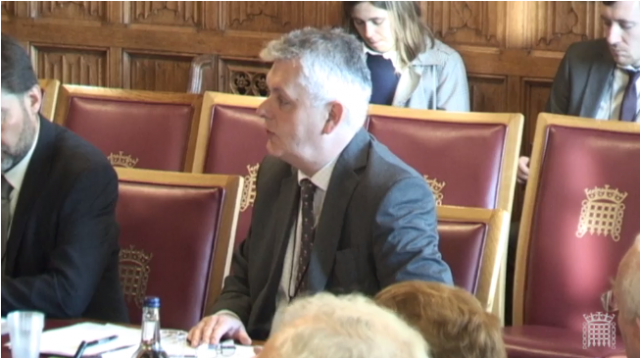News
Ministerial representation for life sciences is needed, says RSB chief executive at House of Lords inquiry
- Details
- 16 January 2018
Mark Downs, chief executive of the RSB, called for a life sciences ‘champion’ that would act at a Minister of State level, whilst giving evidence today at the House of Lords.
The House of Lords Science and Technology Select Committee heard evidence in response to the Life Sciences Industrial Strategy from Downs alongside bioscience experts Mr Jon Bassett, policy and scientific development director at the Institute of Food Science and Technology, and Professor Paul Kellam, chair-elect of the policy committee of the Microbiology Society.
Downs highlighted the need for a government champion to take responsibility for the implementation of the life sciences strategy.
"I would hope that whoever that is would take into account the broader debate about the range of biosciences. If this champion was at ministerial level you would hope that it would at least be a Minister of State.
“Having cabinet level of representation would of course be extremely welcome. Lord Willets [previously Minister of State for Universities and Science] had that, and we would like to see that reintroduced.”

Downs speaking at the inquiry (photo credit: Parliamentlive,tv)
Downs called for a breadth of interest and experience in the advisory oversight group that would report to this champion, with representatives of the public and the private sector.
“That group shouldn’t be representative of just the pharma and biotech sector, but should also have ethical representation and from professional bodies too, along with patient and consumer groups that have an interest in the agenda.”
Downs also spoke on the need for the life sciences strategy to recognise the breadth of the biosciences during the session.
Downs commented that while the strategy sets out important goals and aspirations it misses out on opportunities to make links across the whole of biosciences, including the agritech food chain supply sector, environmental science, veterinary medicine, and plant sciences.
“The government, and the public at large may believe that the life sciences is only the areas of biotech and pharmaceutical, but there is a huge benefit of linking these other areas along with blue sky research.”
Downs also noted that the current timeline outlined by the strategy for increased R&D funding may be too long, and that there is a need to close the gaps between the UK and sector competitors sooner. The current strategy has set a timeline of ten years to increase R&D funding to 2.4% of the GDP.

The Life Sciences Industrial Strategy, released last year, "sets out proposals for how the UK can continue to capitalise on its strengths in the sector" according to author Professor Sir John Bell
Regarding Brexit, Downs commented on the need to remain heavily engaged with the European Reference Laboratories, and also the need to ensure the UK continues to attract and grow a wide breadth of talent and skills.
“I want to emphasize that it’s not just the outstanding professors that we want to attract to the UK.
“We need technicians, we need people working in the environment, we need people in the tech sector – we need all the people who have the skills we desperately need.”
Downs commended the strength of the biosciences sector in the UK, and the value of looking at home grown successes in innovation and business development for inspiration.
He commented: “There are many examples of businesses that have grown and done extremely well. The reason a lot of international companies invest here is because they see huge value in that.
“We should look to the successes domestically because I think the cultural environment in which innovation takes place is very important.
We have a lot of our own home grown successes, and productivity in the biotech and pharma industries in particular is very good. We should look to those examples.”
The House of Lords Science and Technology Select Committee has been conducting enquiries on the Life Sciences and Industrial strategy since late 2017, with the RSB having responded to their call for evidence as well as responding to the earlier Industrial Strategy Green Paper.
The session is available to watch online.

